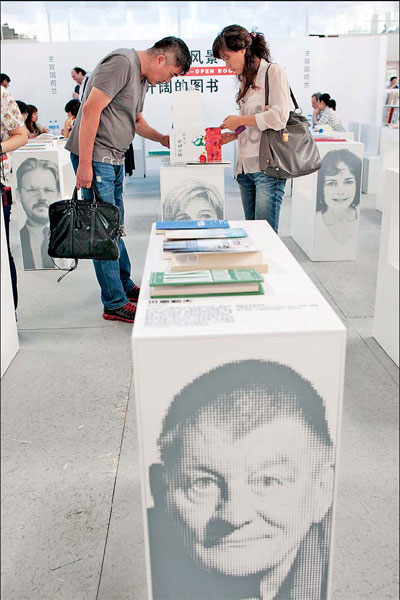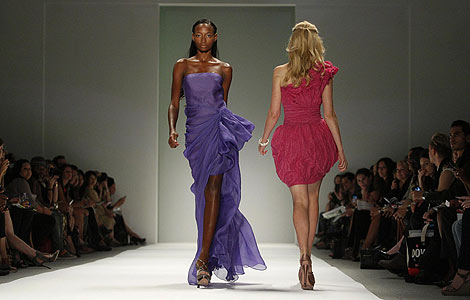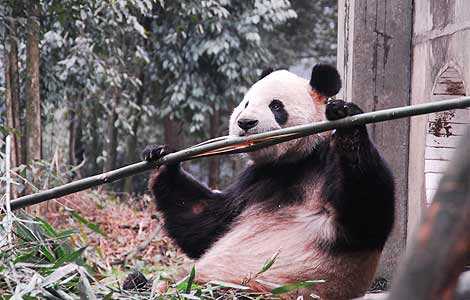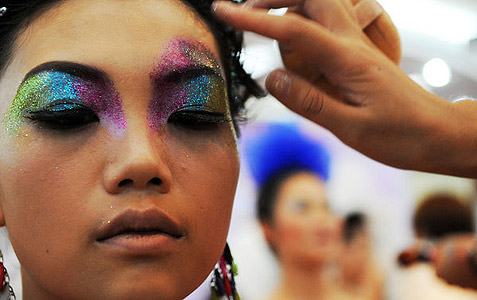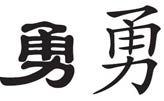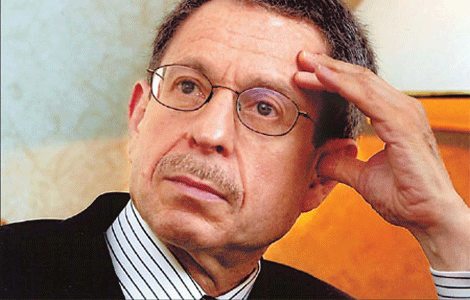Curious first look
Updated: 2011-09-09 07:49
By Yang Guang (China Daily)
|
|||||||||
|
Readers flip through the books on display at the Netherlands exhibition hall during the recently concluded Beijing International Book Fair. [Provided to China Daily] |
The just concluded 18th Beijing International Book Fair had a distinct orange flavor, with the Netherlands as the Country of Honor. Yang Guang reports.
The Netherlands gave the world "total football" but obviously has ambitions to offer more, as demonstrated by it being the Country of Honor at the recently concluded 18th Beijing International Book Fair. Halbe Zijlstra, Dutch state secretary for education, culture and science, said at the opening ceremony the Netherlands was honored to use the book fair to promote Dutch culture, especially literature.
Kang Kai, journalist and book critic with China Reading Weekly, comments that while the Dutch trio on the soccer pitch - Marco van Basten, Ruud Gullit and Frank Rijkaard - are familiar to Chinese, the Dutch literary trio - Willem Frederik Hermans, Gerard Reve and Harry Mulisch - are not so well known.
"If one day Dutch literature shone like its soccer, Chinese publishers would line up for the copyrights," Kang says.
During the five-day book fair, the Netherlands staged 53 programs under the theme "Open Landscape, Open Book".
The idea behind the theme, according to Henk Propper, head of the Dutch Literature Foundation, the organization behind the programs, is that people have to open up their minds to new ideas and ways of thinking, to develop themselves.
For Propper, the best aspect of the book fair was that both speakers and visitors were open to ideas, discussions and to thinking freely.
"In the Netherlands, the response in the press has been enormous," he says. "Never has an international cultural event received so much attention on television, radio and in the newspapers."
About 30 Dutch writers were present at the book fair, all of whom have one or more recent publications available in Chinese translation.
"As representatives of Dutch literature, they are curious about China's literature, publishing industry and fast-changing society at large," Propper says.
Dutch writers Kader Abdolah, Herman Koch, Margriet de Moor, J. Bernlef and Adriaan van Dis held conversations with Mao Dun Literature Prize winner A Lai, avant-garde writer and director Zhu Wen, urban fiction writer Xu Zechen and cyber writer Murong Xuecun.
Topics of the conversations aimed to create a natural connection between the writers involved and included sustainability, the art of curiosity and the challenges of multicultural society.
Kader Abdolah, an Iranian emigre to the Netherlands who named himself after two of his friends executed in Iran, says he couldn't write his stories in his own language and therefore escaped and made a new writer of himself.
"My message to you and other Chinese writers is this: write from the bottom of your hearts," he says in a conversation with A Lai, a Chinese novelist of Tibetan descendent. "The whole world is waiting for your works."
A Lai, whose Mao Dun Literature Prize-winning novel Red Poppies describes feudal Tibetan life before the liberation of Tibet in 1951, says in the 1960s, he used to be told what was appropriate to write, and that was the reason he didn't want to go to school. "Now, of course, there's much greater freedom," he says.
During the past decade, about 100 Dutch books have been introduced to China. Even so, Dutch literary translator Shi Huiye says the number is small, in comparison with the 300 Dutch titles translated into German each year.
One of the reasons for this is the lack of eligible Dutch-Chinese translators. According to Radio Netherlands Worldwide, 90 percent of the introduced Dutch titles are translated "secondhand" from their English, German or French editions.
Robert van Gulik, with his Judge Dee mysteries, the protagonist he borrowed from the 18th century Chinese detective novel Celebrated Cases of Judge Dee, remains the best-known Dutch writer, although philosophers Erasmus and Spinoza, and historian Huizinga are increasingly popular among Chinese intellectuals.
According to Propper, much contemporary Chinese poetry was translated into Dutch in the 1980s. Poets Bei Dao and Duo Duo are well known to Dutch readers. The interest has increased since the 1990s. The Slow Fire is a quarterly journal devoted to Chinese literature.
"Geographically a small country, the Netherlands is in fact a big country for publishing and arts," says Lin Songyu, editor of translated literature with Guangzhou-based Flower City Press, who has been committed to introducing Dutch literature since 2005.
For Lin, both Chinese publishing professionals and ordinary readers have much to learn from the Netherlands. "Chinese should reflect on our reading preferences," Lin says. "Too many books about achieving success in life stand among the Chinese best selling list, while on the Dutch list there is more informative, serious reading matter."
Propper says during the book fair, about 60 copyrights of Dutch titles were sold, mainly children's literature and literary nonfiction, and more will follow.
"Dutch publishers understand that for a real cultural exchange, to create interest in Chinese titles to be published in the Netherlands, is an important step," he says.
"Many of the 16 publishing houses present at the book fair have already decided to come back next year, which is an excellent result considering none of them ever came to Beijing before."
Chitralekha Basu contributed to the story.
(China Daily 09/09/2011 page19)
